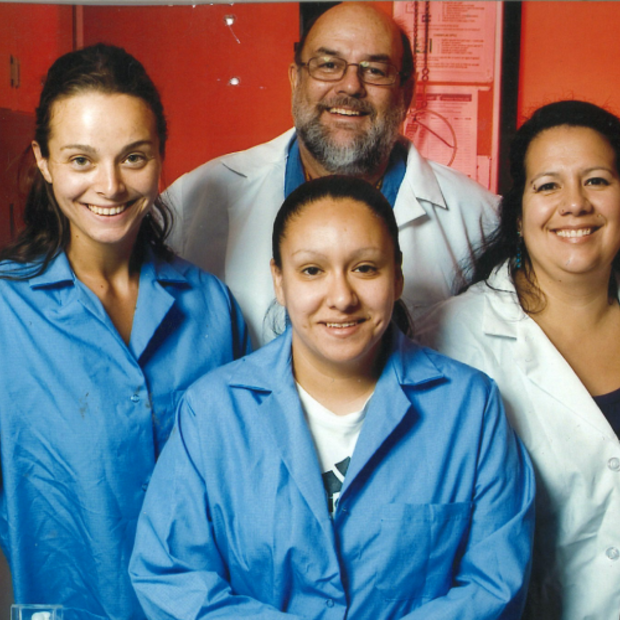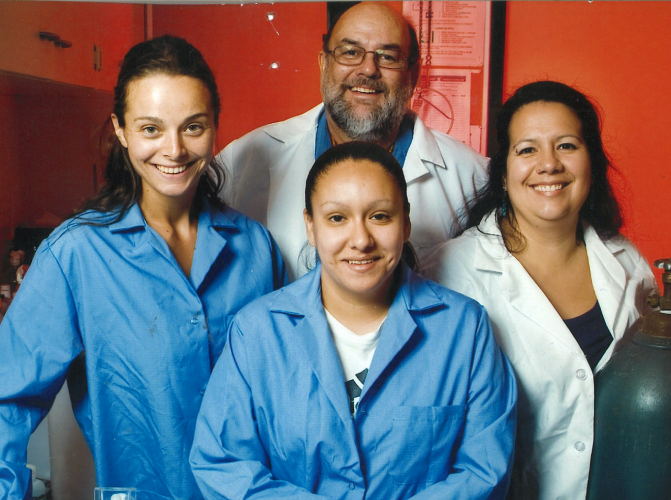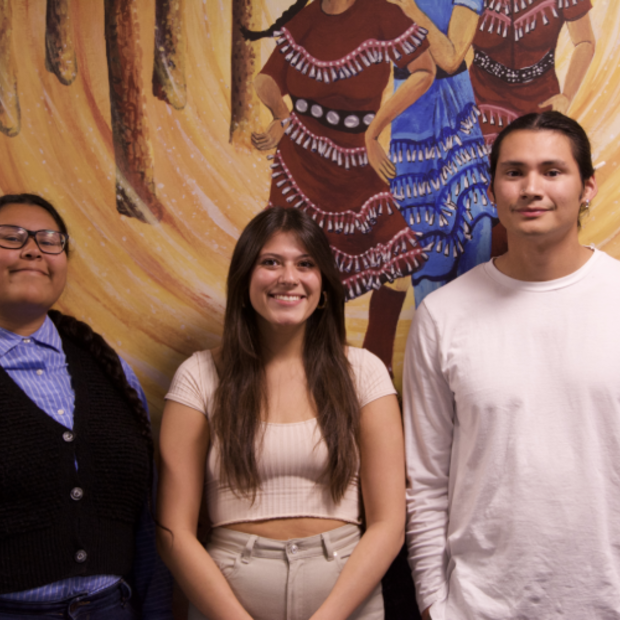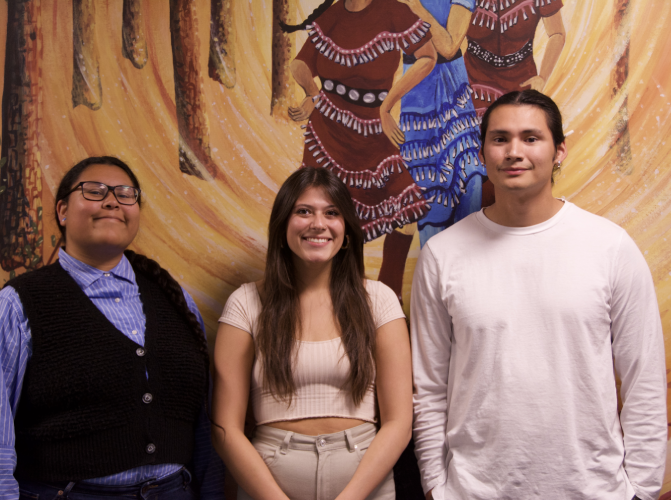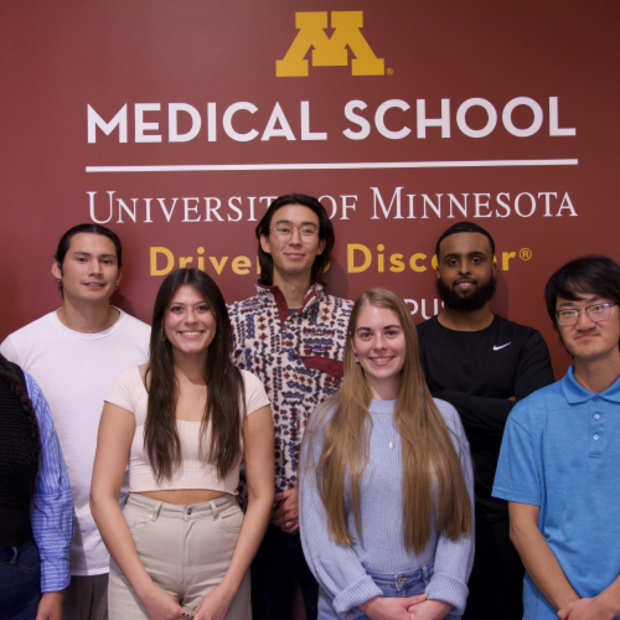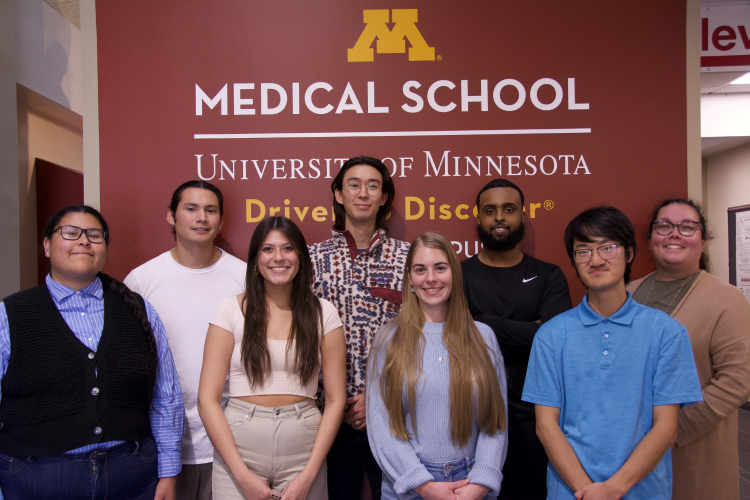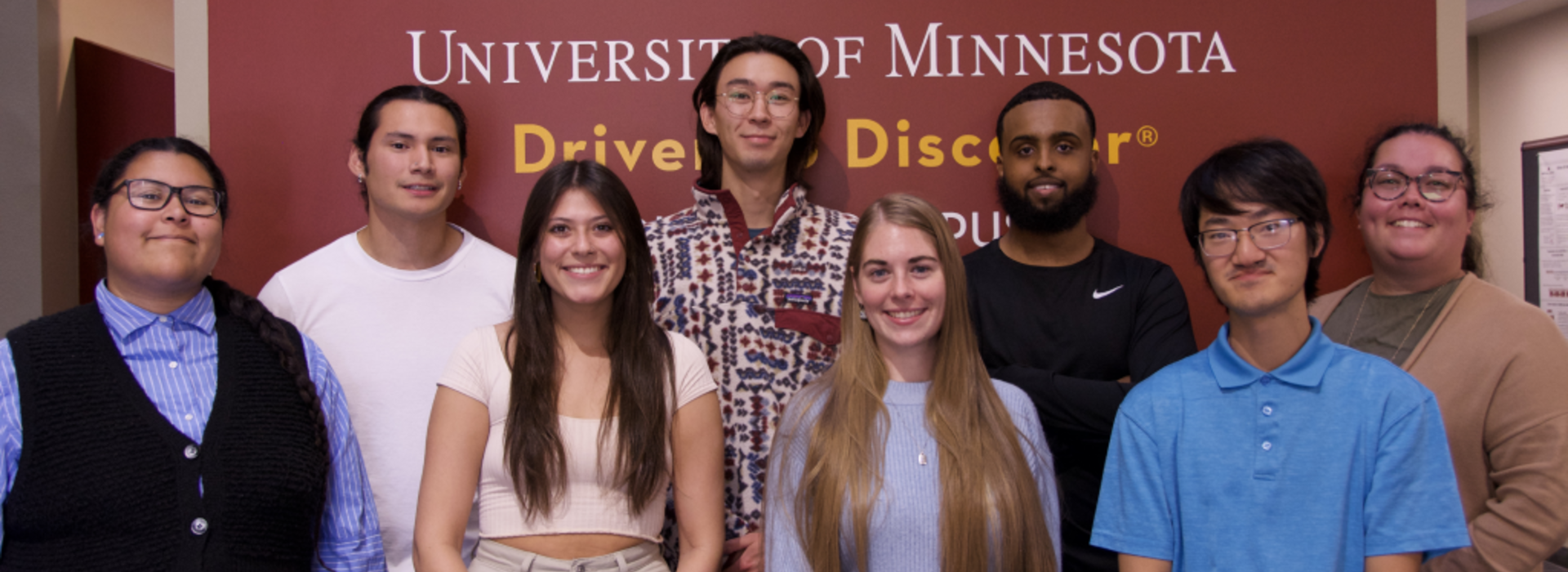
Biomedical Sciences (BMS) MS Program: Gateways to Medicine and Research
Welcome to the Gateways to Medicine and Research MS Program!
The Gateways to Medicine and Research Master's Program is an umbrella program recently created at the University of Minnesota Medical School, Duluth campus. We just graduated our inaugural 2023-24 class!!
The Gateways MS Program was created to provide training for students seeking additional training and experiences to to strengthen their application to medical school or transition to careers in biomedical research. The umbrella MS program consists of two tracks: a 2-year Research Track with thesis (Plan A MS) and a 1-year Medical Track (non-thesis, Plan B MS).
Goal
The Gateways MS Program aims to fill the need for transitional programs for students interested in careers in medicine or biomedical research. The program focuses on increasing access and diversity in the healthcare and research workforce by recruiting among underserved populations from MN, the Upper Midwest, and beyond.
Background/Mission
Background/Mission
The Duluth Regional Medical School (DMED) trains physicians who serve rural MN and Native communities. The DMED is ranked #5 in the graduation of physicians in primary care, #1 in Family Medicine practitioners, and #2 in the graduation of Native physicians. Existing DMED training programs support underserved students from elementary school to college. Yet, a significant gap exists between completion of BA/BS and entry into MD/PhD programs. The Gateways MS Program focuses on increasing diversity into terminal degrees, with a preference for students from the Northland who can progress to serve these communities as highly trained professionals. Training a diverse healthcare and research workforces will alleviate a historic lack of access to critical services for underrepresented and underserved populations from MN, the Upper Midwest, and beyond.
Why choose the Gateways MS Program?
Who should apply to the Biomedical Sciences MS?
Everyone is Welcome!
The BMS MS Gateways to Medicine and Research Program is designed for students interested in professional health careers or biomedical research who desire additional training, mentoring, and advising to strengthen their academic and professional credentials for admission to health professional or graduate schools, or for entry in the biomedical workforce. This umbrella program has two tracks based on desired outcomes. The Medical Track, 1-year (3 semesters) Plan B MS, provides relevant, specialized content and experiences for students interested in health professions. The Research Track is a 2-year Plan A MS with a research thesis that provides targeted training and research experiences on biomedical sciences. The mission of the Gateways MS Program is to recruit and train diverse students that upon graduation will enrich the region with their newly gained expertise. We anticipate these students will continue their training in regional MD or PhD programs or transition to related careers, including lab specialists, teaching, biotech industry, or other professions.
This umbrella program has two tracks based on desired outcomes.
- The Research Track is a 2-year Plan A MS with thesis that provides individualized training and research experiences in diverse disciplines of biomedical sciences.
- The Medical Track, 1-year (Summer + 2 semesters) Plan B MS (no thesis) provides specialized biomedical content and experiences for students interested in health professions.
Is the Program open to anyone?
Everyone is welcome to apply! The Gateways MS Program will be a natural fit for regional students with a bachelors degree who wish to further their education in a small city close to nature and home. We will recruit students from diverse STEM disciplines, including pre-med, cell biology, human biology, biochemistry, or equivalent majors. Students with other backgrounds are also encouraged to apply with a description of how their unique experiences will enrich the program and how the program will help them reach their career goals.
Am I a Good candidate for the Gateways MS Program?
The Gateways MS Program will be a natural fit for regional students who wish to further their education in a small city with all the services and amenities yet close to nature and home. We recruit students from diverse STEM disciplines, including pre-med, cell biology, human biology, biochemistry, or equivalent majors. Students with other academic backgrounds are also encouraged to apply with a description of how their unique experiences will enrich the program.
What are the advantages of the Gateways to Medicine and Research MS Program?
Advantages of the Gateways to Medicine and Research MS Program:
- Master's Degree: A main difference between a Master program and a Post baccalaureate certificate program is that an MS is a degree-granting program. When you graduate from the Gateways MS program, you can attach the “MS” title to your name.
- Research Experiences: For students interested in biomedical research, the Research Track offers few required courses along with personalized content and experiences over a two- year period guided by experienced mentors. Our campus has a specific strength in Neuroscience, but we have experts in other disciplines, including Genetics and Genomics, Immunology, Reproductive Physiology, Cancer Biology, Toxicology, Parasitology, Anthropology, Lyme disease, and others.
- Paid summer stipend: students on the Research track will need to commit to an immersive, paid summer research experience that will provide them with the technical skills to complete critical research objectives.
- Clinical Experiences: For students interested in health careers, the Medical Track offers tailored content and clinical experiences along with dedicated MCAT preparation. Clinical experiences include shadowing at St. Luke’s Hospital, visiting the Center for Alcohol and Drug Treatment, obtaining the BLS certificate, and attending clinical skills sessions (suturing, ultrasound, imaging, etc.) with one of our MD faculty.
- Summer jumpstart: The Medical Track starts in July with a focus on providing a Foundations of Biomedical Sciences and MCAT preparation. This early focus on skill development along with structured MCAT study will set students up for success in the fall courses and MCAT testing in January.
- MCAT / Kaplan: The program provides students with Kaplan subscriptions to prepare for the MCAT at no extra cost.
- Skill Development: Students from underserved and underrepresented backgrounds, non-traditional students and those who have experienced significant hardships typically complete college with significant gaps in critical skills. Students can enroll in our Professionalism, Learning and Leadership Skills courses to develop these skills in preparation for transition to MD or PhD programs or to the healthcare or research workforce.
- Teaching philosophy: The Gateways MS Program is taught only in person in the Duluth campus of the UMN Medical School. We train a class of 65 medical students in a single building that makes faculty highly accessible. This highly interactive environment supports our “high contact - high content” teaching model.
- Mentoring: Each student will be assigned a faculty mentor during the first weeks of the program. Students and mentors will sign a mentoring agreement that will guide the development of a productive mentor / mentee relationship.
- Wraparound Support: The program offers multiple lines of student support, including system-wide Student Resources and Clinic to program specific meetings with our learning specialist. Second year medical students support Gateways Scholars as tutors and help with MCAT prep. We also organize activities and day trips to provide team-building opportunities.
- Campus Life: The Medical School is located within the UMD campus, a medium-sized campus overlooking Lake Superior surrounded by urban forests, ponds, creeks, and trails.
- Leadership Opportunities: Students will have opportunities to demonstrate leadership by serving on Gateways committees: Executive, Curriculum, Admissions. Student opinions are respected and play a critical role in ensuring the highest quality of the program.
- Scholarships: The program secured a grant from the Genentech Innovation Fund that provides scholarships supporting tuition costs and fees for Indigenous students. We are actively working to identify other funding sources to partially support all students.
What is the Curriculum of the Gateways to Medicine and Research MS Program?
Graduation requirement will be completion of 30 credits in one or two years, depending on the Track. Credits are earned in high level graduate courses using a mix of delivery styles, including reading primary literature, writing reports, discussion-based classes, problem-based learning (PBL), and student presentations. The active learning, innovative curricula are tailored for each track around the science of human physiology and disease. The curriculum was developed and is delivered by experienced faculty who course-direct and / or teach in the foundational phase of the medical curriculum.
MCAT preparation is integrated in the curriculum: The program starts in the summer with dedication to MCAT preparation in the Critical Thinking and Clinical Skills course. This course will be highly structured to ensure students follow the Kaplan study, review and testing plan and don’t get distracted by other obligations. Students will attend live sessions and complete modules in person to develop team study skills.
We offer Professionalism, Learning and Leadership Skills courses along with integration of these skills in the courses. Importantly, we offer critical experiences depending on the track: bench research, clinical experiences and community projects.
- Students on the Medical Track will follow a highly structured curriculum to assist with the short timelines and the need to complete the program in 1 year and take the MCAT. Students will experience a mix of classroom content, clinical and community experiences, and dedicated MCAT study time. Medical Scholars will have opportunities to shadow at St. Luke’s Hospital and the Center for Alcohol and Drug Treatment, obtain the BLS certificate, train in basic clinical skills, and participate in community projects for credit as part of their Capstone Project. The curriculum has extensive content on health disparities threaded throughout. Students will demonstrate preparedness for medical school by maintaining a strong GPA and performing well in the MCAT.
- Students on the Research Track will have few core courses and multiple electives in their area of interest, including classes from the Twin Cities campus. They will gain bench skills with experienced mentors in exciting research areas, including neuroscience, genetics / genomics, immunology, cancer biology, physiology, toxicology, infectious disease, and parasitology. Students will complete and defend a research thesis that will demonstrate competence and independence.
Overall, this program should appeal to students interested in: (1) health professions (new applicants and near misses), (2) exploration of academic careers in biomedical research, (3) biotechnology / pharmaceutical industry, (4) teaching health sciences, or (5) broader applications of biomedical knowledge in business / entrepreneurship, regulatory affairs, writing, or policy.
Learning Outcomes
Upon graduation, Gateways Scholars will demonstrate:
Common outcomes for all students
- Exhibit the skills of a lifelong learner: nurture a growth mindset, creativity, problem solving, critical thinking, leadership, communication, collaboration, adaptability, curiosity, self-reflection, set goals, take ownership of your future, nurture your passions
- Develop skills in teamwork, community-building, time management and personal wellbeing while operating in a high performance environment
- Demonstrate competency to read, understand, and critically analyze the relevant concepts presented in the primary literature
- Exhibit the ability to present information clearly, logically, and critically, both orally and in writing
- Demonstrate professionalism in the interaction with instructors and peers in the academic setting
Research Track
- Demonstrate proficiency in the fundamental concepts and techniques in biomedical research
- Exhibit the ability to critically analyze concepts presented in primary literature
- Exhibit the ability to present information clearly and logically, orally and in writing
- Understand and apply the ethical standards in science
- Demonstrate professionalism and ability to work in a collaborative environment
- Exhibit independent thinking, experimental planning and bench work
Medical track
- Demonstrate knowledge in biomedical and social science content relevant to medical school
- Demonstrate proficiency in health care disparities, specifically related to Indigenous communities
- Exhibit critical thinking and analysis of concepts presented in primary literature
- Demonstrate professionalism in the interaction with providers and patients in clinical settings
News & Events
SCRIPPS News
(9/21/23) https://www.denver7.com/university-paves-the-way-to-get-more-native-americans-into-health-care
Native News Online
(3/1/23) New UMN Medical School Program a ‘Stepping Stone’ for Native American Students | Health
Duluth News Tribune
(2/13/23) Duluth's U of M Medical School receives $750,000 for Native American recruitment, new master's program
Medical School
(2/13/23) U of M Medical School, Duluth Campus receives $750,000 award to support creation of new master’s program, training of Native students
DEI Statement
Diversity goals
The Gateways to Medicine and Research MS Program was developed to provide transitional training for diverse groups of students from underserved or underrepresented backgrounds who aspire to careers in the healthcare or biomedical research fields. These students graduate college with knowledge and skills gaps that prevent their transition to professional or graduate schools. The Gateways MS Program is open to EVERYONE. We will specifically recruit and train students from diverse backgrounds and those who have experienced significant hardships in life, including Indigenous and rural MN students, 1st Gen, students from low SES (Pell Grant eligible), and students who are neurodiverse or have disabilities.
The Gateways MS Program is committed to advancing the diversity goals of Duluth campus (campus climate), the UMN Medical School and the UMN system through a culturally inclusive environment. Students and faculty will have access to the resources available through the Graduate School Diversity Office.
Admissions Requirements
Students need to have completed a bachelor's degree or equivalent from an accredited college or university in the biological or physical sciences or a related field.
The preferred undergraduate GPA is >2.90. Students with lower GPAs are encouraged to contact us to determine fitness. The reason for this GPA is to ensure students have the minimum skills to succeed in the rigorous curriculum. Upward trajectory, scores in STEM courses, and hardships during college years (sickness, full-time work, others) are important criteria of holistic review for the Admissions Committee.
Applicants must submit undergraduate transcripts and following documents and test score(s):
- Medical track: MCAT preliminary (not official, free AAMC full test) score above 488 (required)
- Research Track: GRE: 60th percentile or above (optional)
International applicants must submit language score(s) (required)
Contact

Director of Graduate Studies
Dr. Pedro Fernandez-Funez
pfernand@d.umn.edu
218-726-6863
Medical School, SMED333

Graduate Program Coordinator
Anna-Marie Zaidi
gateways@d.umn.edu
218-726-7417
Medical School, SMED315
